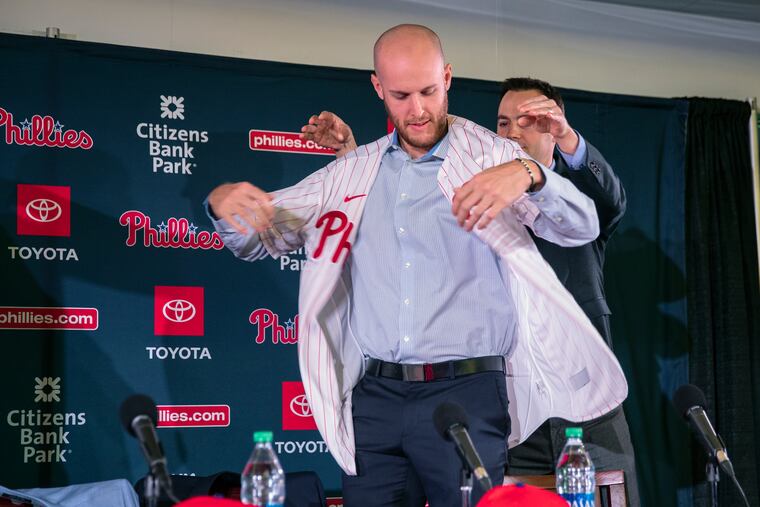Phillies introduce Zack Wheeler, but still seem to be a pitcher short
The Phillies have added Wheeler, but they plan to rely on Zach Eflin, Vince Velasquez, and Nick Pivetta to fill out the bottom of their starting rotation.

The words came Monday morning from a different Phillies manager, but it sounded quite similar to the tune sung a year earlier by Gabe Kapler.
The Phillies, manager Joe Girardi said after the team introduced free-agent signees Zack Wheeler and Didi Gregorius, are “really excited” about their starting rotation. Wheeler, armed with a 97-mph fastball and the eighth-best ERA in last season’s second half, should be an upgrade at the top of the rotation along with Aaron Nola. Jake Arrieta, in the final year of a $75 million deal, will slide into the third spot.
“And then you have Eflin, Velasquez, and Pivetta, three of our younger guys, to fill out the rotation,” Girardi said. “We feel really good about our rotation, where it’s headed.”
The Phillies, just like they did last season, appear ready to place a large bet on the development of Zach Eflin, Nick Pivetta, and Vince Velasquez. All three have shown flashes of promise, but it was the same bet that played a key role last season in keeping the Phillies from the playoffs and sent Kapler to San Francisco. Now, the Phillies will try again.
Eflin, Pivetta, and Velasquez were each shuffled last season between the rotation and bullpen as they combined for a 4.69 ERA. The Phillies were plagued last season by injuries and their lineup did not produce the way they had planned. But it was their rotation — just one starter posted an ERA better than 4.00 — that hurt them the most.
It was expected that the Phillies would address that this winter by adding two starters and awarding the final rotation spot to Eflin, Pivetta, or Velasquez. Instead, they have so far added only Wheeler while constructing a rotation that requires two of their three young arms.
“I mean, first of all, I don’t know that for certain that we won’t add another starter. This is December, what’s today, the 16th? So, we’ve got a long way to go before spring training, so it’s possible that we will,” general manager Matt Klentak said.
“But secondly, I believe that — Joe just kind of touched on it — I think that, when you add someone to the front of your rotation and now you have the experienced guys there, I think that takes a lot of the pressure off the final two spots there.”
The Phillies do still have time to add another starting pitcher, but they seem to be running short of resources. They are roughly $6 million from the threshold of the competitive-balance tax after having committed $14 million in 2020 to Gregorius, who will start at shortstop, and $23.6 million to Wheeler. The Phillies have never paid the tax, a 20% fee on overages. And the Phillies seem hesitant to pay it in 2020.
If not, Klentak will be challenged to keep next season’s payroll below $208 million while signing another starter, having enough funds to address the bullpen and bench, and leaving room for in-season additions.
“We're getting pretty close to that line,” Klentak said. “The official stance is we continue to be opportunistic about it. That's what our owners have asked us to do since the day I got here. How that manifests itself, I don't know. But we're going to continue to explore opportunities and see what's out there and take it day by day.”
The Phillies, Klentak said, are built to win the National League East. A division title will likely require a 10-win improvement from last season’s .500 record, and it will certainly require more stability from the starting rotation. They can expect stability from Nola and Wheeler and hope that Arrieta returns stronger after surgery to remove bone chips from his elbow.
And then they will cross their fingers on the back of the rotation.
Eflin finished last season with a 4.13 ERA, but he allowed three runs or fewer in seven of his last eight starts, finding success after pitching his own way and ditching the game plan presented by Kapler and former pitching coach Chris Young. Pivetta had a 5.74 ERA last season in 13 starts and spent more time as a reliever, but is considered to have the most untapped potential of the three.
Velasquez returned to the rotation in June and had a 5.33 ERA in his final 17 starts, but he has a 95-mph fastball that keeps the Phillies hoping.
The offseason allows the team the chance to talk itself into believing that next season will be the one in which the three young pitchers will turn the corner. The stakes of that bet would be a bit lower if the Phillies needed just one to develop instead of two.
Perhaps the odds this season will be helped by new voices as the Phillies replaced Kapler with Girardi and Young with pitching coach Bryan Price, who was well regarded during his time with Reds.
The message may have been the same Monday, but the man delivering it was not. For the Phillies, they hope that provides the difference.
“We still believe in the stuff that these guys possess, and the upside that they have and their ability to bounce back,” Klentak said. “I think it’s important that all of our pitchers are going to have the chance to work with Bryan Price this year. I think that’s something that we’re really optimistic about and think could really help our group.”